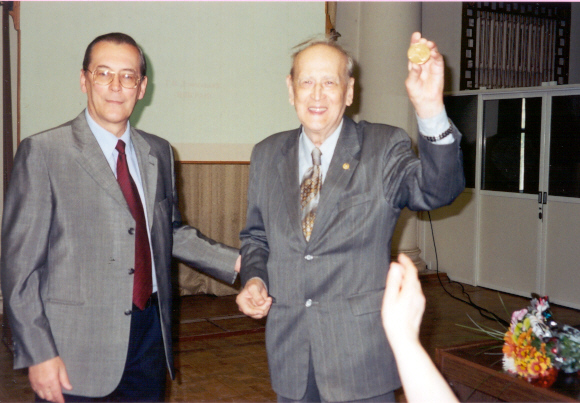Заведующего Отделом лептонов высоких энергий и нейтринной астрофизики
академика Георгия Тимофеевича Зацепина
с присуждением медали РАН имени Д.В.Скобельцына
Медаль РАН имени Д.В.Скобельцына учреждена в 2004 году. Присуждается раз в пять лет за выдающиеся достижения в области физики элементарных частиц и космических лучей. Г.Т.Зацепин - первый лауреат этой награды.
Желаем ему дальнейших успехов в науке, крепкого здоровья и счастья!!

Photo: Georgy Zatsepin (right) and Victor Matveev, member of Presidium of the Russian Academy of Sciences.
Presidium of the Russian Academy of Sciences has awarded D.V. Skobeltsin's 2004 gold medal to academician G.T. Zatsepin for his outstanding contribution to cosmic ray physics, elementary particle physics, astrophysics, for scientific first-rate school creation.
G.T. Zatsepin is an author of the discovery of nuclear cascade process as a nature of extensive air showers. He is a pioneer in the study of ultra-relativistic particle propagation through photon gas, in the study of main features of cosmic ray muons and neutrinos, in the experimental study of ultra-high energy muons and their interactions with atomic nuclei.
In neutrino astrophysics he was involved in the studies of high energy cosmic neutrino production mechanism and detection of neutrinos from collapsing stars in the Galaxy, in development of new methods for solar neutrino detection.
Of a wide world resonance was his fundamental prediction of cosmic ray cut-off effect (Greisen - Zatsepin - Kuzmin effect).
G.T. Zatsepin made a great contribution into creation of the Baksan Neutrino Observatory, including the famous Gallium-Germanium Neutrino Telescope, he is one of the principal participants of the Russian-American collaboration in the Solar neutrino experiment SAGE.
He has created a well known theoretical and experimental school in cosmic ray physics, neutrino physics and astrophysics. G.T. Zatsepin was one of the organizers of Soviet-Italian collaboration for studying neutrino and cosmic ray physics problems.
Lately the scientist has paid his attention to actual problems of cosmic and atmospheric neutrino studies with the large volume international detector LVD, to studies of solar neutrino flux with SAGE, and special features of EAS nature.